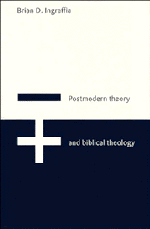Book contents
- Frontmatter
- Contents
- Acknowledgements
- List of abbreviations
- Note on translations of the Bible
- Introduction: postmodernism, ontotheology, and Christianity
- 1 NIETZSCHE'S MOCKERY: THE REJECTION OF TRANSCENDENCE
- II HEIDEGGER'S FORGETTING: THE SECULARIZATION OF BIBLICAL ANTHROPOLOGY
- III DERRIDA'S DENIALS: THE DECONSTRUCTION OF ONTOTHEOLOGY
- 11 From the ends of man to the beginnings of writing
- 12 Deconstituting the subject
- 13 Writing and metaphysics
- 14 Reading the law: the Spirit and the letter
- 15 Scripture or écriture: the limitations of Derrida's deconstruction of ontotheology
- Conclusion: ontotheology, negative theology, and the theology of the cross
- Notes
- Bibliography
- Index
11 - From the ends of man to the beginnings of writing
Published online by Cambridge University Press: 01 June 2011
- Frontmatter
- Contents
- Acknowledgements
- List of abbreviations
- Note on translations of the Bible
- Introduction: postmodernism, ontotheology, and Christianity
- 1 NIETZSCHE'S MOCKERY: THE REJECTION OF TRANSCENDENCE
- II HEIDEGGER'S FORGETTING: THE SECULARIZATION OF BIBLICAL ANTHROPOLOGY
- III DERRIDA'S DENIALS: THE DECONSTRUCTION OF ONTOTHEOLOGY
- 11 From the ends of man to the beginnings of writing
- 12 Deconstituting the subject
- 13 Writing and metaphysics
- 14 Reading the law: the Spirit and the letter
- 15 Scripture or écriture: the limitations of Derrida's deconstruction of ontotheology
- Conclusion: ontotheology, negative theology, and the theology of the cross
- Notes
- Bibliography
- Index
Summary
In order to make this attempt of thinking recognizable and understandable within philosophy, it was possible at first to speak only within the horizon of the existing philosophy and within the usage of the terms familiar to it.
Heidegger, “Letter on Humanism”To attempt an exit and a deconstruction without changing terrain, by repeating what is implicit in the founding concepts and the original problematic, by using against the edifice the instruments or stones available in the house, that is, equally, in language. Here, one risks ceaselessly confirming, consolidating, relifting (relever), at an always more certain depth, that which one allegedly deconstructs.
Derrida, “The Ends of Man”In reading Derrida's “The Ends of Man,” we enter the problem of reading itself. In this essay Derrida gives a reading of Heidegger's existential analytic in Being and Time, and he also reads Heidegger's own reading of his existential analytic in his “Letter on Humanism.” Both Heidegger and Derrida defend the existential analytic against Sartre's misreading, against his anthropologistic reduction of Heidegger's Being and Time. Derrida recalls, as Heidegger had recalled in his “Letter,” that according to the opening sections of Being and Time, “anthropology and humanism were not the milieu of his thought and the horizon of his questions. The ‘destruction’ of metaphysics or classical ontology was even directed against humanism” (M 118).
Yet after defending Heidegger against this “misreading,” a fact that in itself should prevent us from seeing Derrida's deconstructive readings as an opening up of texts to arbitrary interpretations, Derrida goes on to uncover a relève of humanism in Heidegger's work.
- Type
- Chapter
- Information
- Postmodern Theory and Biblical TheologyVanquishing God's Shadow, pp. 167 - 177Publisher: Cambridge University PressPrint publication year: 1995



